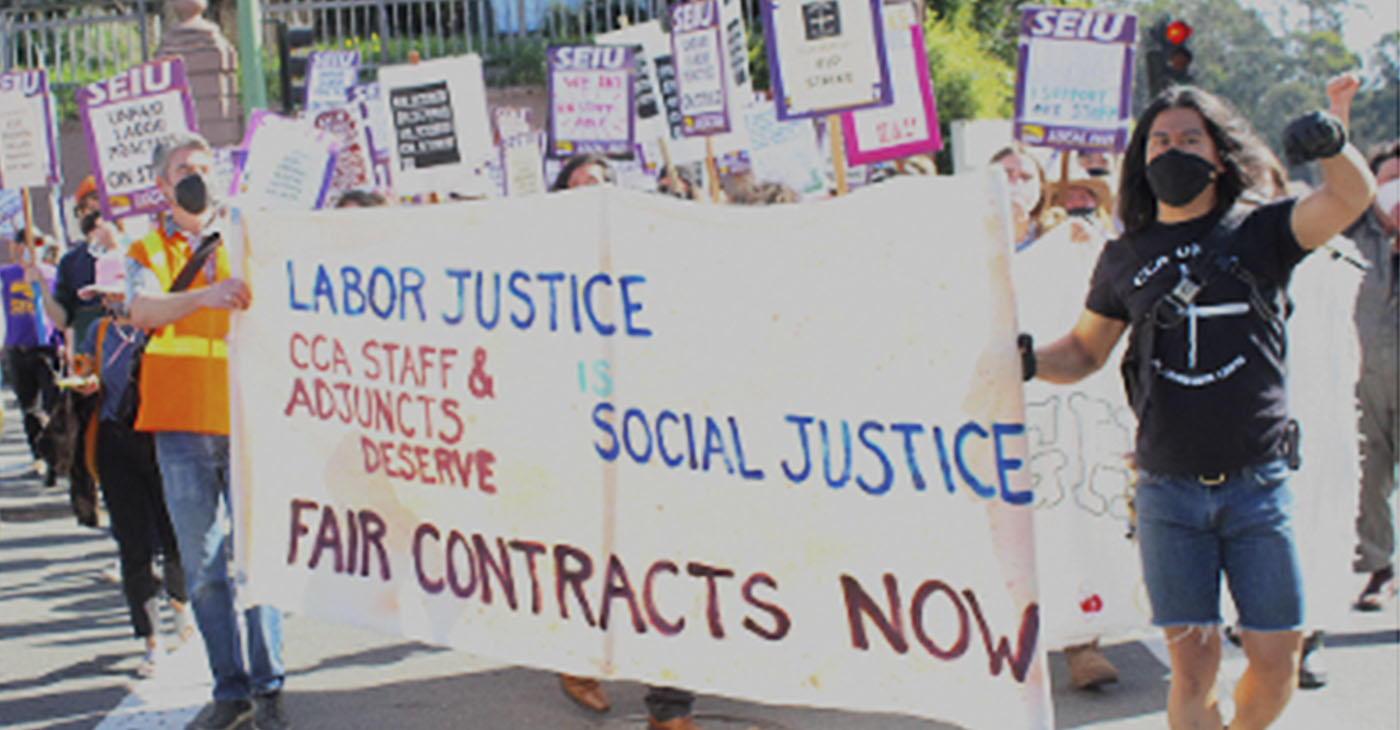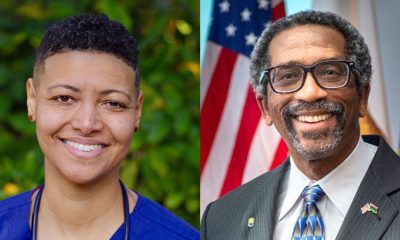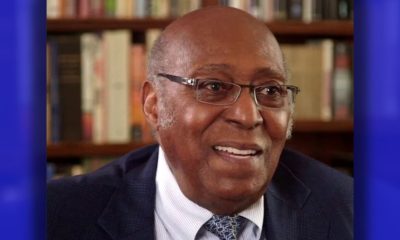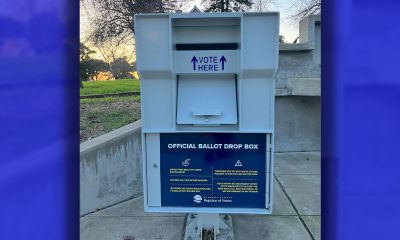Activism
California College of the Arts Staff Union Strikes, Citing Unfair Labor Practices
Members of the California College of the Arts staff union point to salaries at the administrative level, which they see as excessively high, and question why the school isn’t paying their lower wage workers more. The school’s 2020 990 filing shows four administrators made well over $270,000 in 2019. President Stephen Beal made a base salary of more than $580,000 while working 37.5 hours per week. Such a salary is over $150,000 more than both the current Mayor of San Francisco and the President of the United States. The 990 also estimates Beal made over $100,000 in addition to his base salary in “other compensation from the organization and related organizations.”

By Zack Haber
The staff union at California College of the Arts (CCA), a small, private college founded in 1907, engaged in a four-day strike and protest. They’re accusing the school of unfair labor practices that include stalling contract negotiations in an effort to withhold pay increases and benefits.
“We have a unionized workplace now,” said SEIU 1021 chapter President Matt Kennedy, who’s worked in the tech department of the college for 10 years. “CCA needs to acknowledge that. It’s taking forever to come to an agreement because they aren’t.”
The protests featured rallies, teach-ins, group art-making projects and daily pickets that started February 8 and end on February 12. The actions are taking place on the school’s San Francisco campus every day except Wednesday, when the protest moved to the school’s Oakland campus. Around 200 people, including union members and their supporters, showed up each day to the pickets.
In interviews with this reporter, Kennedy, along with three other current or former workers at CCA, all accused the school of bargaining in bad faith.
“CCA has been stonewalling and dragging their feet,” said Kēhau Lyons, an academic advisor who’s worked at CCA for about two and a half years and has been observing the bargaining sessions. “The management side just doesn’t want to get this completed.”
CCA’s staff successfully voted to unionize with SEIU 1021 in April of 2019. Since then, staff members say they have not received any raises outside of those required by law. While contract negotiations started in October of 2019, CCA’s staff is still working without a union contract. A study by Bloomberg Law based on National Labor Relations Board data shows that, between 2004 and the first half of 2021, the average amount of time it took employers and unions to agree on a first contract was a little over one year and one month. The union and CCA’s negotiations have, thus far, taken over two years and four months.
In an email, CCA Director of Communications Daniel Owens-Hill, disagreed with staff who accused the college of stalling negotiations.
“CCA remains ready and willing to negotiate as frequently as needed to achieve a fair and mutually beneficial collective bargaining agreement,” Owens-Hill wrote. “The college has a comprehensive proposal on the table that provides wage increases for our valued staff while also maintaining our ongoing commitment to student financial aid and a financially sustainable future.”
On September 27 of last year, National Labor Relations Board Regional Director Valerie Hardy-Mahoney sided with the union by issuing a Complaint and Notice of Hearing stating that CCA had “been failing and refusing to bargain collectively and in good faith with the union.” In that same document, she also proposed new bargaining guidelines for the college to follow going forward.
CCA is currently offering a 2% wage increase to all staff in the union. Workers interviewed for this article see that raise as inadequate and stressed that their most important request while bargaining has been “raising the floor” for staff salaries. To pay the expenses needed to live in the Bay Area, staff said, they want a minimum wage of $55,000. Kennedy said salary records show 40% of CCA staff makes less than $55,000 per year, and 10% make between $36,000 and $45,000. For many workers, the 2% increase would fall short of providing the minimum salary.
CCA workers point to salaries at the administrative level, which they see as excessively high, and question why the school isn’t paying their lower wage workers more. The school’s 2020 990 filing shows four administrators made well over $270,000 in 2019. President Stephen Beal made a base salary of more than $580,000 while working 37.5 hours per week. Such a salary is over $150,000 more than both the current Mayor of San Francisco and the President of the United States. The 990 also estimates Beal made over $100,000 in addition to his base salary in “other compensation from the organization and related organizations.”
In April of 2020, Beal’s base salary was cut by 25%, while the senior vice president’s was cut by 10%, and the vice president’s was cut by 5%.
CCA staff union members say they have noticed a high employment turnover rate which they attribute to their co-workers not receiving high enough pay. Emails from CCA’s Human Resources Department show that, since August, 19 staff union members have stopped working at the school, which is about 15% of the total union staff.
Randy Nakamura has taught as an adjunct at CCA’s graduate design program for the last six years, and is also part of CCA’s adjunct union’s bargaining unit. CCA’s adjunct union is separate from the staff union, but Nakamura and other adjuncts are also trying to reach a contract with CCA.
Nakamura says that since the CCA adjunct union contract expired in June of 2020, he and his fellow union members’ experiences bargaining to renew their contract have been similar to the staff union’s efforts to get CCA to agree to a first contract.
“CCA has taken every opportunity to not bargain with us,” said Nakamura. “Sometimes they’ll make us wait an hour and a half in a three-hour bargaining session just to talk.”
After a year and a half of bargaining, the adjunct union has not yet been able to renew its contract with CCA. Seeing themselves in a similar struggle as the staff union, over 100 CCA’s adjunct union member supported CCA’s staff union by sympathy striking, and not teaching classes during the strike.
Some adjuncts also joined staff on the picket line. Additionally, members of the CCA Student Union and some other CCA students who sympathize with the staff strike criticized CCA’s 2% wage increase offer as too low and picketed and did not attending classes to show their support.
“The staff and adjunct’s working conditions are student learning conditions,” the CCA Student Union wrote on a recent instagram post. “We as students completely benefit from union bargaining and a fair contract for our beloved staff.”
CCA faculty who are tenured or on tenure track are not part of the staff union and have separate independent contracts. But they also showed support.
“We are not willing to cross the picket line,” reads a support letter released on February 7 that 99 such faculty members signed. “[We] will instead find ways to express peaceful solidarity during the strike, including engaging in strike-related teach-ins and pedagogical activities.”
Through their spokesperson, David Owens-Hill, CCA criticized the strike.
“At a time when we are making rapid progress in negotiations and have reached agreement on so many items, a strike benefits no one,” wrote Owens-Hill in an email, “not our staff, not our faculty, and certainly not our students, who have just returned to fully in-person classes for the first time in nearly two years.”
CCA staff union members disagree with Owens-Hill.
“It’s important to show in our strike that CCA can’t get away with this,” said SEIU’s Kennedy. “Better working conditions and compensation make better learning conditions, and the college needs to make that a priority. But they’re not.”
Activism
S.F. Black Leaders Rally to Protest, Discuss ‘Epidemic’ of Racial Slurs Against Black Students in SF Public School System
Parents at the meeting spoke of their children as no longer feeling safe in school because of bullying and discrimination. Parents also said that reported incidents such as racial slurs and intimidation are not dealt with to their satisfaction and feel ignored.

By Carla Thomas
San Francisco’s Third Baptist Church hosted a rally and meeting Sunday to discuss hatred toward African American students of the San Francisco Unified School District (SFUSD).
Rev. Amos C. Brown, president of the San Francisco NAACP and pastor of Third Baptist Church, along with leadership from local civil rights groups, the city’s faith-based community and Black community leadership convened at the church.
“There has been an epidemic of racial slurs and mistreatment of Black children in our public schools in the city,” said Brown. “This will not be tolerated.”
According to civil rights advocate Mattie Scott, students from elementary to high school have reported an extraordinary amount of racial slurs directed at them.
“There is a surge of overt racism in the schools, and our children should not be subjected to this,” said Scott. “Students are in school to learn, develop, and grow, not be hated on,” said Scott. “The parents of the children feel they have not received the support necessary to protect their children.”
Attendees were briefed last Friday in a meeting with SFUSD Superintendent Dr. Matt Wayne.
SFUSD states that their policies protect children and they are not at liberty to publicly discuss the issues to protect the children’s privacy.
Parents at the meeting spoke of their children as no longer feeling safe in school because of bullying and discrimination. Parents also said that reported incidents such as racial slurs and intimidation are not dealt with to their satisfaction and feel ignored.
Some parents said they have removed their students from school while other parents and community leaders called on the removal of the SFUSD superintendent, the firing of certain school principals and the need for more supportive school board members.
Community advocates discussed boycotting the schools and creating Freedom Schools led by Black leaders and educators, reassuring parents that their child’s wellbeing and education are the highest priority and youth are not to be disrupted by racism or policies that don’t support them.
Virginia Marshall, chair of the San Francisco NAACP’s education committee, offered encouragement to the parents and students in attendance while also announcing an upcoming May 14 school board meeting to demand accountability over their mistreatment.
“I’m urging anyone that cares about our students to pack the May 14 school board meeting,” said Marshall.
This resource was supported in whole or in part by funding provided by the State of California, administered by the California State Library via California Black Media as part of the Stop the Hate Program. The program is supported by partnership with California Department of Social Services and the California Commission on Asian and Pacific Islander American Affairs as part of the Stop the Hate program. To report a hate incident or hate crime and get support, go to CA vs Hate.
Activism
Oakland Ambassadors Strengthen Ties and Aid Efforts in Ghana
Oakland natives and esteemed members of the African American Sports and Entertainment Group (AASEG), Jonathan P. Jones and Dr. Maritony Efua Jones, recently embarked on a significant journey to Ghana as guests of the World Martial Authority Ghana. This trip signifies a crucial opportunity to bolster partnerships, explore new avenues of collaboration, and contribute to impactful initiatives in Ghana.

By Post Staff
Oakland natives and esteemed members of the African American Sports and Entertainment Group (AASEG), Jonathan P. Jones and Dr. Maritony Efua Jones, recently embarked on a significant journey to Ghana as guests of the World Martial Authority Ghana.
This trip signifies a crucial opportunity to bolster partnerships, explore new avenues of collaboration, and contribute to impactful initiatives in Ghana.
Upon their arrival at Katota Airport in Accra, Ghana, the Joneses were warmly received by His Royal Majesty Okatakyie Asafo Boakye III, the distinguished king of Sanzule Kingdom in the Eastern Nzema, and Etse Nyamedi of World Martial Authority, Ghana.
Nyamedi accompanied the Joneses to the city of Mepe, which had recently experienced flooding, to assess damages and engage with local leaders, elders, and youth regarding the city’s urgent needs after major floods last fall.
Key concerns and priorities identified by the community include comprehensive flood mitigation measures, agricultural support, housing initiatives, educational enhancements, improved healthcare access, and the development of communal recreational spaces.
The Joneses were also graciously invited to meet with leaders of The Church of Jesus Christ of Latter-day Saints at their headquarters in Accra. This meeting provided insights into ongoing humanitarian efforts in Ghana and explored avenues for collaboration to further assist Ghanaian communities.
The LDS leaders shared their prompt response to the recent flood, demonstrating their commitment to humanitarian aid by dispatching substantial supplies including medical provisions, sanitation items, blankets, and food to assist flood victims just four days after the disaster.
Additionally, Boakye extended a special invitation to the Joneses to his palace, where they were pleasantly surprised with a heartfelt recognition ceremony. Maritony Jones was honored as the Queen Mother of the Sanzule Kingdom in acknowledgment of her dedicated work, while Jonathan Jones was lauded and welcomed as the ambassador of the Sanzule Kingdom, symbolizing a meaningful homecoming to their ancestral land.
The visit not only strengthens ties between Oakland and Ghana but also underscores the collaborative spirit and commitment to meaningful progress and humanitarian endeavors shared by all involved parties.
Activism
Calif. Anti-Sex Trafficking Advocates Discuss Competing Bills, Strategies
Advocates from across California are challenging state officials and community leaders to support legislation that provides resources and services for survivors and victims of human trafficking, as well as assistance as they transition back into civil society. Some of those advocates are also calling for more effective state policy to curtail trafficking, a crime that has an outsized impact on Black children, particularly girls.

By Bo Tefu, California Black Media
Advocates from across California are challenging state officials and community leaders to support legislation that provides resources and services for survivors and victims of human trafficking, as well as assistance as they transition back into civil society.
Some of those advocates are also calling for more effective state policy to curtail trafficking, a crime that has an outsized impact on Black children, particularly girls.
According to the FBI, a report covering a two-year period found Black children accounted for 57% of all juvenile arrests for prostitution. In addition, 40% of sex trafficking victims were Black and 60% of those victims had been enrolled in the foster care system.
“It is time to hold the perpetrators who take advantage of our children accountable,” said the Rev. Shane Harris, a San Diego-based activist, former foster youth and founder of the Peoples Association of Justice Advocates, (PAJA), a national civil rights organization and policy think tank.
“It is time to send a thorough message that if you seek to buy a child for sex, you will pay the highest criminal penalties in this state,” added Harris who was speaking at a rally at the State Capitol earlier this month. Harris was speaking in support of Senate Bill 1414, authored by Sen. Shannon Grove (D-Bakersfield), which calls for people who buy sex from minors to be punished with a felony. The punishment includes a two-year prison sentence and a $25,000 fine.
Harris said the PAJA is the only civil rights organization in the state that supports SB 1414.
Harris urged other Black-led groups who favor anti-trafficking legislation more focused on criminal justice reforms (as opposed to stiffer penalties), to “join the movement.”
Many of those civil rights groups fear that SB 1414 could lead to the incarceration of more Black youth.
Those sentiments were echoed in a panel discussion organized by Black women advocates on April 26 to examine the cause and effects of human trafficking in California’s Black communities. The virtual event was hosted by the Forgotten Children, Inc, a faith-based nonprofit that advocates for survivors and victims of human trafficking through anti-trafficking campaigns and initiatives.
Panelists shared the psychological impact of sexual exploitation on youth and children in the long term.
Author and educator Dr. Stephany Powell shared statistics and information revealing that African American women and girls are the most trafficked nationwide.
Powell, who serves as the senior advisor on law enforcement and policy at the National Center on Sexual Exploitation said that national data indicates that sex trade survivors are disproportionately women of color. She stated that male survivors often go unnoticed because boys rarely report trafficked crimes.
Powell said that decriminalizing prostitution in California could increase human trafficking. She argued that Senate Bill 357, authored by Sen. Scott Wiener (D-San Francisco), which was signed into law in 2022 and legalized loitering for prostitution, caused a surge in street-level prostitution.
Panelist and psychologist Dr. Gloria Morrow shared opposing views on decriminalizing prostitution. She said that decriminalizing prostitution could help survivors gain access to state resources and support.
Despite opposing views, Powell and Morrow agree that the Black community needs resources and educational programs to address human trafficking.
-

 Community3 weeks ago
Community3 weeks agoFinancial Assistance Bill for Descendants of Enslaved Persons to Help Them Purchase, Own, or Maintain a Home
-

 Business3 weeks ago
Business3 weeks agoV.P. Kamala Harris: Americans With Criminal Records Will Soon Be Eligible for SBA Loans
-

 Activism4 weeks ago
Activism4 weeks agoOakland Post: Week of April 10 – 16, 2024
-

 Community3 weeks ago
Community3 weeks agoAG Bonta Says Oakland School Leaders Should Comply with State Laws to Avoid ‘Disparate Harm’ When Closing or Merging Schools
-

 Activism2 weeks ago
Activism2 weeks agoOakland Post: Week of April 24 – 30, 2024
-

 City Government3 days ago
City Government3 days agoCourt Throws Out Law That Allowed Californians to Build Duplexes, Triplexes and RDUs on Their Properties
-

 Community2 weeks ago
Community2 weeks agoRichmond Nonprofit Helps Ex-Felons Get Back on Their Feet
-

 Community2 weeks ago
Community2 weeks agoOakland WNBA Player to be Inducted Into Hall of Fame























































